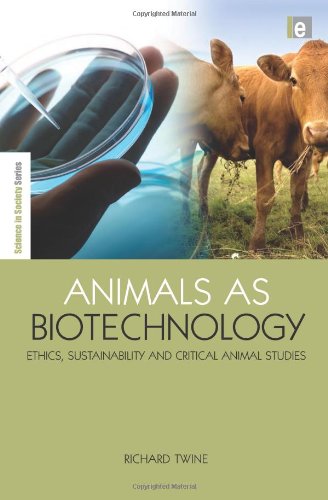حیوانات به عنوان بیوتکنولوژی: اخلاق، پایداری و مطالعات حیاتی حیوانات ۲۰۱۰
Animals as Biotechnology: Ethics, Sustainability and Critical Animal Studies 2010
دانلود کتاب حیوانات به عنوان بیوتکنولوژی: اخلاق، پایداری و مطالعات حیاتی حیوانات ۲۰۱۰ (Animals as Biotechnology: Ethics, Sustainability and Critical Animal Studies 2010) با لینک مستقیم و فرمت pdf (پی دی اف)
| نویسنده |
Richard Twine |
|---|
| تعداد صفحهها |
222 |
|---|---|
| نوع فایل |
|
| حجم |
2 Mb |
| سال انتشار |
2010 |
89,000 تومان
معرفی کتاب حیوانات به عنوان بیوتکنولوژی: اخلاق، پایداری و مطالعات حیاتی حیوانات ۲۰۱۰
ریچارد تواین، جامعه شناس، در کتاب خود “حیوانات به عنوان بیوتکنولوژی”، موضوع روابط انسان و حیوان را در مرکز بحث های پایداری و تغییرات آب و هوایی قرار می دهد. این کتاب با ظهور دو گرایش متضاد در رویکرد ما به حیوانات غیرانسانی شکل گرفته است: انتقال بیوتکنولوژیک در علوم دامی، که هدف آن افزایش کارایی و سودآوری تولید گوشت و لبنیات است. و حوزه نوظهور مطالعات حیاتی حیوانی – بیشتر در علوم انسانی و اجتماعی – که ماهیت روابط ما با حیوانات دیگر را زیر سوال می برد.
بخش اول کتاب بر اخلاق تمرکز دارد و به بررسی انتقادی پارادایم های رایج اخلاق زیستی و روابط قدرت بین انسان ها و غیرانسان ها می پردازد. بخش دوم به بیوتکنولوژی جانوری و اقتصاد سیاسی می پردازد و به بررسی تجاری سازی و مقررات می پردازد. بخش آخر کتاب بر بحث های پایداری و محدودیت ها و بررسی چشم اندازهای اخلاق حیوانات در صورتی که بیوتکنولوژی بخشی از پارادایم اصلی کشاورزی شود، تمرکز دارد. تواین با بررسی اینکه آیا درخواست های فزاینده برای کاهش مصرف گوشت/فرآورده های لبنی در مواجهه با تهدیدات تغییرات آب و هوایی در واقع با درک بشر از پایداری همدست است یا خیر، نتیجه گیری می کند و اینکه آنچه لازم است بازجویی اخلاقی و سیاسی اساسی تر است. روابط و تفاوت ها بین انسان، حیوان و طبیعت
In Animals as Biotechnology sociologist Richard Twine places the question of human/animal relations at the heart of sustainability and climate change debates. The book is shaped by the emergence of two contradictory trends within our approach to nonhuman animals: the biotechnological turn in animal sciences, which aims to increase the efficiency and profitability of meat and dairy production; and the emerging field of critical animal studies - mostly in the humanities and social sciences - which works to question the nature of our relations with other animals.
The first part of the book focuses on ethics, examining critically the dominant paradigms of bioethics and power relations between human and non-human. The second part considers animal biotechnology and political economy, examining commercialisation and regulation. The final part of the book centres on discussions of sustainability, limits and an examination of the prospects for animal ethics if biotechnology becomes part of the dominant agricultural paradigm. Twine concludes by considering whether growing calls to reduce our consumption of meat/dairy products in the face of climate change threats are in fact complicit with an anthropocentric understanding of sustainability and that what is needed is a more fundamental ethical and political questioning of relations and distinctions between humans, animals and nature.




